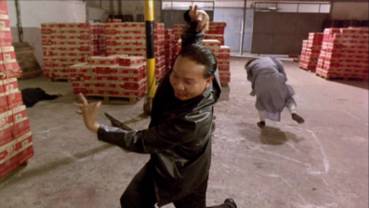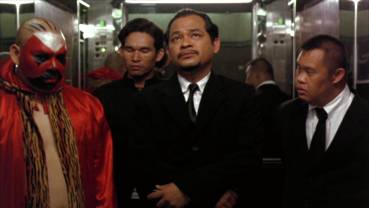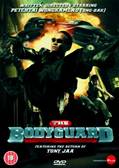Does humour translate from culture to culture? Certainly physical comedy, slapstick in particular, has a universal appeal, while the subtleties of verbal humour can be lost in translation, so to speak. But even within the cultural demographic, there are divisions – the rise of idiot comedy in America has found a sizeable audience outside of home turf, but has left just as many (myself included) utterly bemused.
It's hard to say, without the benefit of exposure to the appropriate material or any experience at all with the language, what constitutes a typical Thai comedy, and even if there is such a thing. The comedic elements of Ong-Bak certainly work for an international audience and it's not all slapstick – the marketplace knives gag (sorry, you'll just have to see it) made everyone I've watched it with laugh out loud. That film's humour stemmed almost completely from one character, who was played by stand-up comedian Petchtai Wongkamlao, making the prospect of an action-comedy in which he was both star and co-director a rather tantalising one. Behold, The Bodyguard. I should be laughing, but for some reason I'm not.
The Bodyguard arrives in the UK on the coat-tails of Ong-Bak and its DVD release appears to be deliberate timed to capitalise on that (both films are released on the same day, albeit by different distributors). It's not surprising – what could have been a hard sell to a minority audience can now be promoted as featuring two of the lead players of the biggest martial arts film of the year, and even a cameo from that movie's (and the genre's newest) star, Tony Jaa.

Action-comedy is a subgenre that eastern cinema has intermittently excelled at, notably in the films of Jackie Chan and Stephen Chow. Between them this hallowed pair have set the bar at an intimidating height, combining jaw-dropping action and laugh-out-loud humour with a deftness that ensures that one element does not detract from the other. The Bodyguard has aspirations in both camps but starts in action mode, as the title character (Wongkamlao) fights a gun battle with a small army of would-be assassins, while a bald reporter continues to broadcast under a table without tonal change, signalling the direction the film will later take. Bullets fly, wires spin Wongkamlao through the air, and squibs explode all over the shop, but it's all rather run-of-the-mill, sub-John Woo stuff, the meat of any number of Hong Kong or even recent Korean police action thrillers.
This sets the tone for the rest of the film, where the action is efficient but undistinguished and increasingly gives way to wildly uneven comedic elements that sometimes spring jarringly out of nowhere, creating the impression of a film that is not sure quite what it wants to be. The plot provides few clues. With his father murdered, the son of a wealthy and well-connected family inherits his sizeable business interests. After a botched kidnap attempt by the gangsters who killed his father, the son finds shelter with a family in the city's slum district, where he falls for a local girl and learns a little humility after visiting the under-funded local school. Hiding his wealthy background, he uses his money to help the people, not realising that he is being hunted by a bodyguard who is looking to protect him from the pursuing gangsters.
This rich boy/poor girl sub-plot may seem to western audiences to be bordering on parody (especially as is plays out here), but straight-faced sugary sentimentality is a regular component of eastern action cinema (even the impressively low key approach of Wai Keung Lau and Siu Fai Mak's 2002 Infernal Affairs tumbled briefly down this road on the death of a key character). Even with this in mind, the narrative flow of these scenes is sometimes a little shambolic. Oddball elements come and go with abandon, the gangster with the penchant for daft costumes prompting his companions to behave with increasingly outlandish stupidity, effectively nullifying the threat they are supposed to represent. Which would be fine if they were actually funny.

But now and again it all comes close to working rather well: Wongkamlao emerging from the swimming pool into which he has jumped to encounter his would-be killer, who has just missed the pool but landed in a threatening pose; his subsequent naked pursuit through busy city streets (although Wongkamlao can't resist a face/arse gag); the twin assassins whose appearance is marked by birds in stylistic slow motion flight; the man who turns up to deliver heartfelt poetry whenever someone is struck by misfortune; Wongkamlao's hypnotically daft kung-fu dancing in the climactic fight. At the end of the film the fourth wall is kicked down as the loud-dressing gangster is driven off complaining about the size of his part and demanding to speak to the director. This self-referencing does provide the film with its most amusing scene, as a Muay Thai-fighting supermarket customer played by Tony Jaa refers to Petchtai Wongkamlao by the character name he had in Ong-Bak, and is rudely informed that he's talking about the wrong film.
The pace is breezy enough, and if comedy is in the funny bone of the beholder then for some the film may strike, if not gold then at least a tarnished bronze (it was certainly a big hit in its native Thailand). But if this release is trading on the success of Ong-Bak then it's that film's fans who will likely comprise its potential audience. It's certainly worth a look, but with Kung-Fu Hustle still doing the rounds, Stephen Chow is in absolutely no danger of losing his action-comedy crown just yet.
| sound and vision |
Framed at 1.78:1 and anamorphically enhanced, the picture is largely pleasing, with colour, contrast and sharpness generally sound. A decent if not exceptional transfer.
Two soundtracks are on offer, 5.1 and DTS. The DTS track is slightly louder, but also has better LFE bass and crisper trebles. Both use the sound stage impressively, especially in the shoot-outs. Explosions on the DTS track sent a bass thunder out that made my sofa tremble.
Subtitles are very clear and very English, with 'wanker' turning up more than once and some very strong insults thrown about by the slum women.
| extra features |
The Making of The Bodyguard (12:57) is a fairly standard EPK, consisting of behind-the-scenes footage and interviews with the main participants at a press launch. It's framed 4:3 but the lower quarter of the screen is obliterated by logos, so the subtitles have to sit at the top. It's in less than pristine shape and fairly artefact-riddled, but still watchable and of mild interest.
There are also three trailers, for this film, Ong-Bak and Born to Fight.
| summary |
A bit of research revealed that this film certainly has its fans, but I found myself groaning a lot more than I was laughing, having seen much of its content done before and better, or in the case of some of the dumber humour, every bit as badly. But there is some good stuff here, and so many things nearly work that it may well be worth a look for fans of the genre, as personal taste really can make a difference between ha-ha and oh-no, and for Ong-Bak fans the film will have its own specific interest. Momentum Asia's disk is light on extras but does the job well enough otherwise, but unless you are a hardened genre fan I'd consider renting before buying – silly isn't always funny.

